Retrospective European Conference on African Studies 2023
 The 9th European Conference on African Studies (ECAS) took place from 31 May to 3 June in Cologne, Germany, and was co-organised by the University of Cologne’s Global South Studies Center (GSSC) and the Catholic University of Leuven’s Institute for Anthropological Research in Africa (IARA). With the theme ‘African Futures’ it aimed to explore the continent’s critical engagements with the past, present, and future of Africa’s global entanglements. The conference brought together over 2000 delegates from 80 countries, delivering 1470 papers across 245 panels or roundtables. ECAS is organised on behalf of the Africa-Europe Group of Interdisciplinery Studies (AEGIS). More than 30 researchers from the ASCL and Leiden University convened a panel or presented a paper.
The 9th European Conference on African Studies (ECAS) took place from 31 May to 3 June in Cologne, Germany, and was co-organised by the University of Cologne’s Global South Studies Center (GSSC) and the Catholic University of Leuven’s Institute for Anthropological Research in Africa (IARA). With the theme ‘African Futures’ it aimed to explore the continent’s critical engagements with the past, present, and future of Africa’s global entanglements. The conference brought together over 2000 delegates from 80 countries, delivering 1470 papers across 245 panels or roundtables. ECAS is organised on behalf of the Africa-Europe Group of Interdisciplinery Studies (AEGIS). More than 30 researchers from the ASCL and Leiden University convened a panel or presented a paper.
Below is a report about the Leiden participation in ECAS. Since many panels and papers overlapped in time, this report covers only a selection.
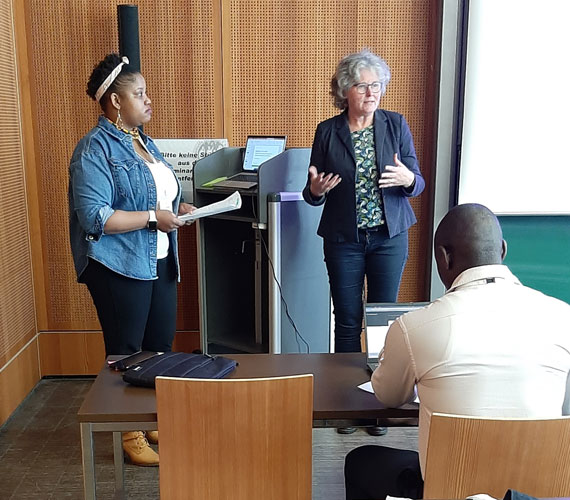 Urban citizenship
Urban citizenship
One Pusumane (PhD candidate University of Edinburgh/ASCL partnership) and Marleen Dekker (ASCL) kicked off with a panel about urban citizenship and precarity. It dealt with questions like: How do marginalised city people read the future? Or how does the state read the future of cities and the people in it? How do neoliberal visions of a modern future impact on urban citizenship? Mandipa Ndlovu (PhD candidate ASCL/Edinburgh partnership) presented a paper on citizenship in Bulawayo, the second city of Zimbabwe. How do its citizens - mainly young males 20-24 years old - perceive their role? Many live in precarious circumstances, she said. On being interviewed about agency, one of her interviewees stated: 'We don't know of agency, all the money is in Harare'.
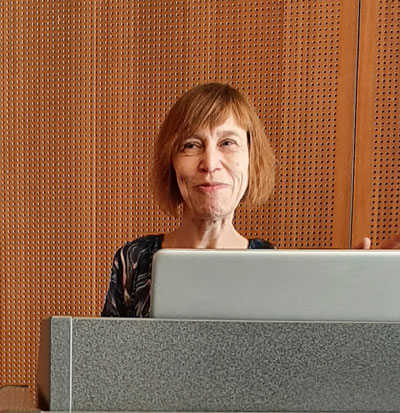 Green religious activism
Green religious activism
Mayke Kaag participated in a panel on green religious activism. African environmentalist action based on Islamic values has been happening on the continent since the 1970s, often also supported and sometimes initiated by African diasporic groups, such as ‘Touba ville Verte’, which aims to green the holy city of Touba in Senegal. Kaag found that African Muslims find it important to be included in more global conversations on the role of Islam in environmental conservation, and this on an equal footing. Collaborations with European NGOs often take the form of development aid, rather than a two-way transaction. Joram Tarusarira of the University of Groningen and a member of the ASCL Community stressed that dominant climate discourses concentrate on economic and material solutions. They overlook sacred and spiritual worldviews, he said, although they are integral to how some communities in Africa understand the world and their place in it. 'We need a research agenda that takes this into consideration', he said.
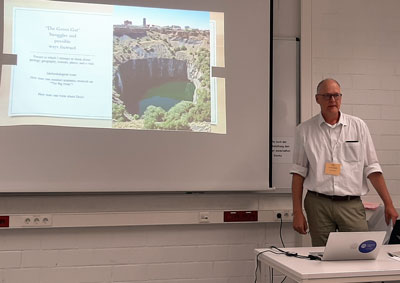 Industrial mining in South Africa
Industrial mining in South Africa
In his panel on the legacy of industrial mining in South Africa, co-organised with Steven Robins of Stellenbosch University, Jan-Bart Gewald (ASCL) elaborated on the city of Kimberley, built upon the detritus of diamond mines that were in operation between 1871 and 2020. Gewald described the impact of toxic mining dust upon the inhabitants of the city: between 1900 and 1940, of the 13,000 death notices for Kimberley 42% died of respiratory organ failure. Mining also came at an enormous environmental cost, associated with extensive deforestation and the establishment of barren mine dumps of waste. Kimberley is currently the only city in South Africa with a declining population. In his contribution, Steven Robins was critical of new forms of extraction including technoscientific megaprojects involving renewable and non-renewable energy in the Karoo, questioning whether they will meet the needs of the residents in the poor towns in this drought-prone, overheating area.
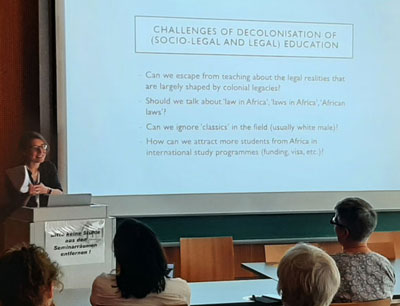 A future for African Studies?
A future for African Studies?
On day two, the panel 'Does European African Studies have a future?' subjected itself to some critical introspection. Carolien Jacobs of Leiden Law School and the Van Vollenhoven Institute zoomed in on the question: What future does a course like 'law and governance in Africa' have in Europe? Particularly because so many laws in Africa are shaped by colonial history. To promote decolonisation of education in the law field, she suggested a number of things: giving explicit attention to the impact of colonisation on current legal systems, giving attention to differences between African countries, placing law in context, being aware where students come from, and taking seriously the question how to attract more students from Africa in international study programmes through funding.
Knowledge production on Africa has been marked by asymmetric power relations for many decades, as Eric Kolavi Hahonou of Roskilde University showed in his presentation, and he suggested African Studies could be inspired by the Cubism movement: ‘Afrocubism’ could challenge the single-story narrative, break up the mold of area studies and represent the object of study under the light of a multitude of viewpoints.
How to make academic cooperation work?
A vivid roundtable (see top photo) that gave the floor to students - rather unique for the conference - was organised on academic cooperation as realised in the VOICE project: Virtual Online International Collaborative Exchange. In this pilot project, the universities of Leiden, Birmingham and Cologne from the EUniWell consortium and three partner universities on the African continent, viz. Mohammed V de Rabat, University of Nairobi, and University of the Western Cape, selected 60 MA and PhD students to collaboratively co-create their understanding of well-being. The students - from very diverse disciplines - did interviews in cities in their respective home countries on the (interrelated) topics of well-being (SDG3), the environment and knowledge. The results were published as blogs. During the roundtable, chaired by Marleen Dekker, students, supervisors and teaching fellows enthusiastically reflected on their experiences, achievements and future perspectives. It was the first time they met after their many online collaborations. Equality had been a very important basis for this collaborative venture, as William Ellis of UWC stated.
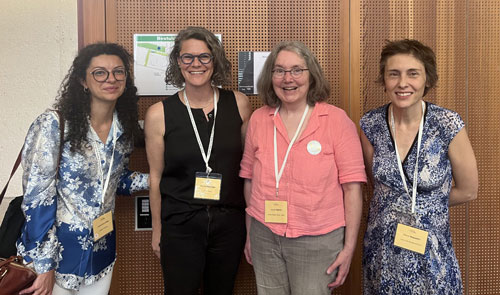 Opening up archives
Opening up archives
An afternoon panel convened by the ASCL Library's Jos Damen and IMAF-CNRS's Fabrice Melka highlighted the importance of African archives and how they strengthen research. The ASCL’s Ursula Oberst and Annachiara Raia presented the project UMADA, funded by the Modern Endangered Archives Program of the UCLA Library, which works on digitising the private library of living poet and imam Ustadh Mau from the Indian Ocean island Lamu, Kenya. His archive includes audio recordings of poems and sermons. The project aims to provide the materials via Open Access platforms, opening them up for new audiences and enhancing new research into overlooked local literary productions from postcolonial contemporary Kenya. Elena Vezzadini (Institut des Mondes Africains) presented lessons from a survey project into the archives of the women’s movements in Sudan 1940-2010, making clear the necessity of trust, and posing the important question of what the ethics are towards vulnerable people’s archives in politically volatile situations.
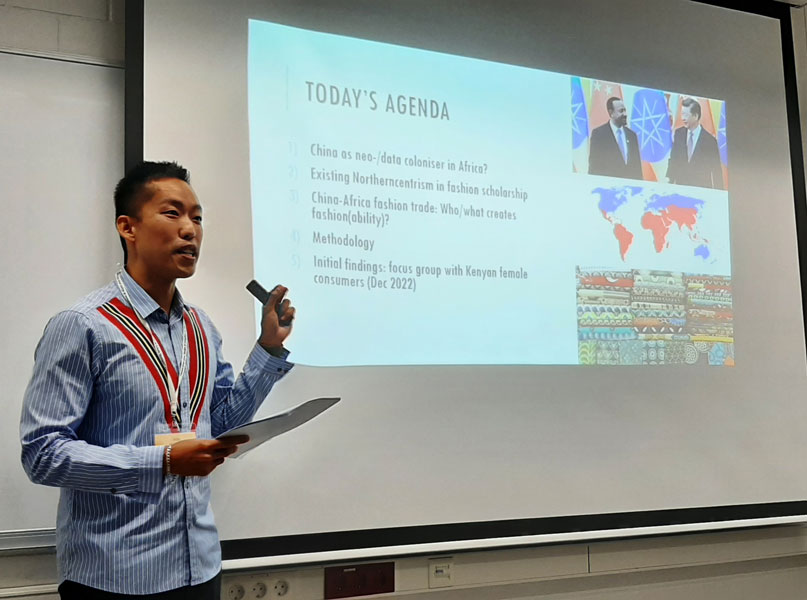 China-Africa fashion trade networks
China-Africa fashion trade networks
Under the umbrella of the AEGIS CRG 'Africa in the World', the ASCL's Mayke Kaag and Alena Thiel of Halle University organised a panel on digital public infrastructure and what this means for the future of African statehood. Evans Awuni of the University of Erfurt showed that the Ghanaian government’s digitalisation programme has implications for inequalities beyond connectivity, including skills, and therefore also for the future of work. Looking at the influence of China, Tommy Tse of the University of Amsterdam presented research on China-Africa networks of fashion trade on e-commerce platforms in the Kenyan market. Has China become a neo-coloniser? Not according to preliminary results, Tse said. Kenyan consumers seem to prefer African informal traders.
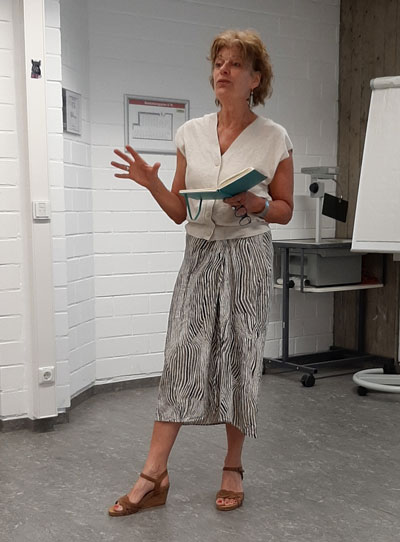 Media forerunners
Media forerunners
On the last day of the conference, Mirjam de Bruijn (Leiden) and Bruce Mutsvairo of Utrecht University convened a panel on 'media forerunners', reflecting on emerging socio-political youth leadership in times of conflict and digitalisation. This builds on the research project Decoding Digital Media in African Regions of Conflict (DDMAC). How, for example, do networks on social media become actors in conflicts? Samba Dialimpa Badji of Oslo Metropolitan University presented on Mali associations of bloggers: these are both citizen journalists and cyber activists. Financial aid for these associations comes from e.g. the EU; so (how) does this influence them?
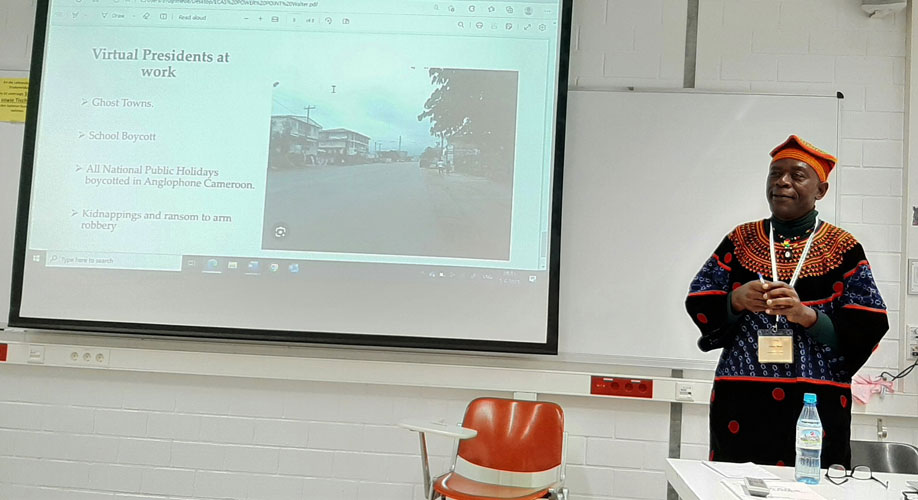 Walter Nkwi of Leiden University gave a fascinating example linked to the Anglophone crisis in Cameroon. In 2017 youths he calls 'Virtual Presidents' from the diaspora in the USA, Europe, and South Africa used the internet, Twitter, and WhatsApp to influence groups of people on the ground.
Walter Nkwi of Leiden University gave a fascinating example linked to the Anglophone crisis in Cameroon. In 2017 youths he calls 'Virtual Presidents' from the diaspora in the USA, Europe, and South Africa used the internet, Twitter, and WhatsApp to influence groups of people on the ground.
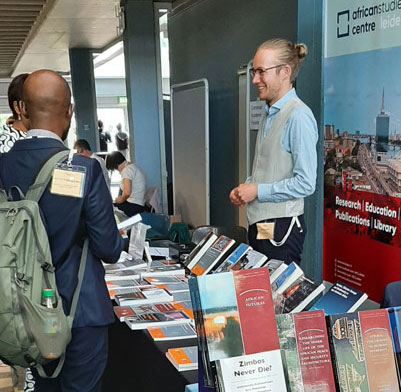 During the entire conference, participants were able to discover the richness of the ASCL publication series at the ASCL's fabulous book stand.
During the entire conference, participants were able to discover the richness of the ASCL publication series at the ASCL's fabulous book stand.

